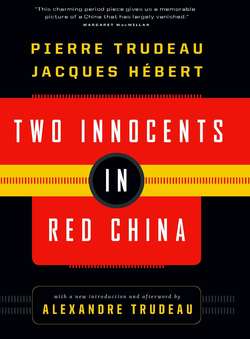Читать книгу Two Innocents in Red China - Pierre Elliot Trudeau - Страница 11
На сайте Литреса книга снята с продажи.
ОглавлениеTRANSLATOR’S NOTE
Most English-Canadian readers will require, as I did, one explanatory note. Charles-Paschal-Télésphore Chiniquy was a priest who first became famous in 1844 as a temperance crusader, was involved in two scandals that led to his excommunication, was ordained as a Presbyterian minister at the age of fifty, and wrote a series of sensational anti-Catholic books which were at one time known around the world.
Two other references will be familiar to Canadian readers but not to others. Henri Bourassa, Quebec nationalist leader and founder of the Montreal newspaper Le Devoir, was noted for his oratory; and at a Eucharistic Congress in Montreal he made an extemporary speech, in reply to the suggestion that French Canadians ought to speak English, which was published under the title Religion, langue, nationalité (1910).
“Frère Untel” is the pseudonym of Brother Pierre Jérôme (Jean-Paul Desbiens), whose biting critique of Quebec education and society, Les Insolences du Frère Untel, was published by Jacques Hebért in the year of the events recorded here. It was this book that popularized the term “joual” (allegedly a rural pronunciation of cheval), which had been introduced by André Laurendeau, editor of Le Devoir, as an epithet for the kind of slovenly French that he wanted to banish from Quebec speech.
Finally, alert readers will notice that there were five members of the group that included Messrs Hébert and Trudeau, and will find it hard to establish a list. For the record, the other three were: Denis Lazure, psychiatrist; Micheline Legendre, puppeteer; and Madeleine Parent, trade-union official.
I.M.O.
The editor of the 2007 edition adds:
Please note that we have opted to retain Hébert and Trudeau’s original spellings for Chinese names and terms, despite the fact that these do not always conform to modern conventions. Hence the reader will visit “Beijing” and encounter “Mao Zedong” in Alexandre Trudeau’s introduction, but “Peking” and “Mao Tse-tung” in the text that follows.
